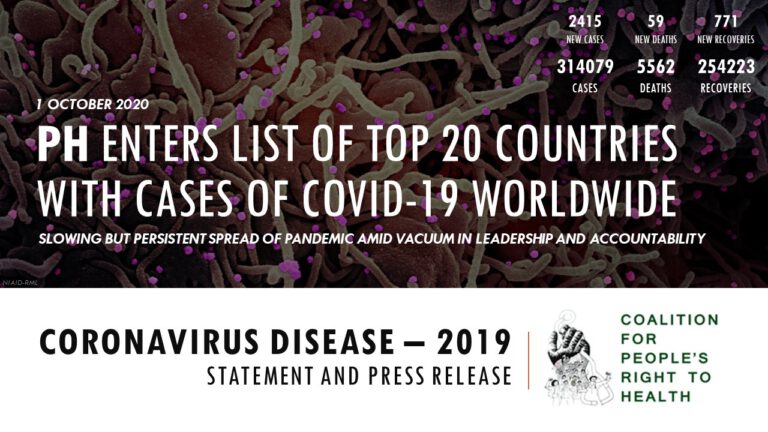
Philippines enters list of top 20 countries with COVID-19 cases worldwide; slowing but persistent spread of pandemic amid vacuum in leadership and accountability in health response As of October 1, 2020, the Philippines (with 314,079 total cases) has eclipsed Pakistan (313,431, only reporting 625 new cases today) in terms of total cases of COVID-19, placing it in the top 20 worldwide.
While the government celebrates its misleading claim of having the “best testing policy” in Asia, cases of COVID-19 continue to climb throughout the entire country, amid persisting gaps in the pandemic response, especially in leadership and accountability. While the country is no longer averaging 4000 cases per day, the local spread of the pandemic continues among the provinces. Apart from the increased positivity rates across Mindanao, COVID-19 has now reached Batanes, recording its first cases over the past few days. Many of these newly identified patients were locally stranded individuals (LSIs), who departed from cities and urban centers with community transmission, but were not or inadequately tested. Prior to the NTF and DILG pronouncements on LSIs last July, beneficiaries of the Hatid Tulong program were initially tested only with rapid antibody tests, which are not approved by the Department of Health for screening.
Government agencies then decided to shift the responsibility of testing to local government units to avoid “double handling.” But, as seen in what has happened since, certain LGUs are struggling to keep up with testing LSIs, their close contacts, and the ensuing local transmission. This merely reflects the long-standing problem of health sector underdevelopment in the Philippines. Many of the poorer regions are unable to adequately provide for health infrastructure and services despite a system of devolution allegedly designed to put more responsibility and accountabilty on local politicans.
However, the reality is that health capabilities remain stagnant and underfunded, which COVID-19 merely exposed even further. The facts show that an overwhelming majority of testing laboratories in the country are privately-owned, such as the ones run by Philippine Red Cross. Because of this, much-needed services such as COVID-19 testing are driven by profit rather than service. It is ironic that the DOH, who should be regulating beyond merely accrediting the laboratories, is now calling for price control and efficient reporting, when they absolutely have the mandate to demand and create better services for the people as their right. In this continuing public health emergency, CPRH calls on health officials to assert their primary role in the pandemic response, and not just be relegated to an advisory role. It must use its authority to call out violations, especially by those in power, and any policy that seeks to “open up” the economy without any regard to improving health capacity.
Proactive engagement by a more competent leadership is urgently needed to stop the iatrogenic (or self-induced) spread of COVID-19 amid overwhelming institutional ignorance and self-interest. Quarantine protocols and health policies should only be debated on based on the merits of evidence and social determinants, not on perceived economic gains, political convenience, or the lobbying of those with vested interests. Otherwise, the country risks leading more in cases, or worse, risking the virus’ persistence like many other diseases.
Now more than ever, we must demand for an even higher health budget that will respond to needs beyond the pandemic—one that fulfills the people’s right to health in their workplaces, schools, and communities.###